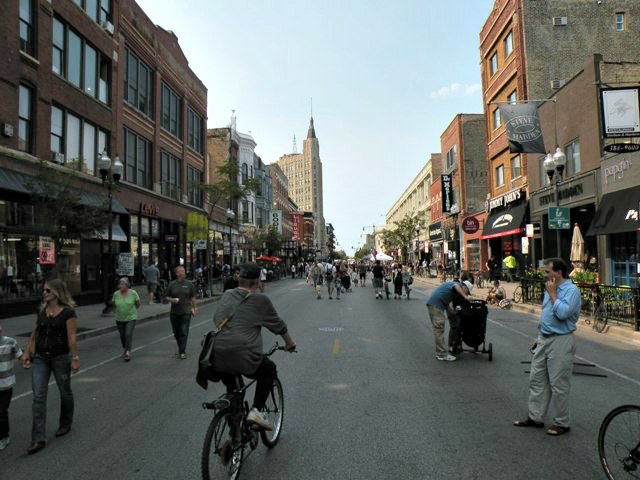Open Streets Chicago Gives A View At Post-Apocalyptic Wicker Park/Bucktown
By Chuck Sudo in Arts & Entertainment on Sep 17, 2012 6:20PM

Photo credit: Chicagoist/Chuck Sudo
If the zombies do overrun us and society has to rebuild, a post-apocalyptic Wicker Park would look much like current-day Wicker Park, minus the cars.
That’s what we gathered walking the length of Open Streets Wicker Park/Bucktown Sunday. Open Streets Chicago closed down Milwaukee Avenue from Division Street to Western Avenue for five hours Sunday and ceded the street to pedestrians, bicyclists, skateboarders, strollers and dogs, with nary a motorist in sight, all while the casually attractive formed polite lines for brunch.
We’ve been asked before why the negative attitude about Open Streets? We’re not pessimistic about the concept, only the execution. Open Streets Chicago and the Active Transportation Alliance have an ideal platform here to advocate for car-free living and it makes sense to host these events in dense neighborhoods like Wicker Park/Bbucktown or downtown where sharing the streets with motorists can be tense, to say the least. That they don’t seem to capitalize on this is frustrating. Instead we sense a slight chaotic feel as pedestrians and cyclists work to share the street with each other—the opposite of what the ATA advocates.
Another qualm we have with Open Streets is organization. They’re trying to throw a host of activities at people in a short frame of time, instead of working to make this a season-long event like New York City’s Summer Streets or San Francisco Sunday Streets. Imagine how novel this project would be if it was spread out over the course of a summer: you could have yoga sessions at the Polish triangle; a skate park in Pritzker Park downtown, a casual bike ride or skate along the same stretch of Milwaukee Avenue during a weekday. Better planning and event coordination would go a longer way towards fostering the community, culture, and health of the city than as currently presented.
As it stands now, Open Streets Chicago is an example good in theory, lacking in execution.